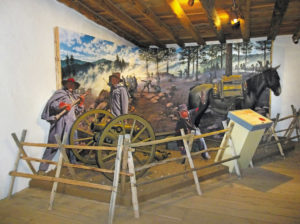By John Mattingly
Fall is a seductive time. The changing colors, rich afternoon light and impending curiosity about the approach of winter. The hot days of summer become a memory and life in the garden moves to preparation rather than anticipation. Regardless of how difficult the summer, the summer solstice and Halloween feel like a reward for enduring the worries of water, weather, weeds and varmints. And larger four-legged mammals.
When young, the end of the day was my enemy because there was always something more to get done on the farm, but with age, the setting sun has become a dear friend. To watch the sun rise and set without seeing the diurnal rotation as bracketing our daily chores is one of the blessings of getting old.
Though I’ve farmed and gardened for over sixty years – starting with putting sunfish in the ground under corn, tomato and zinnia plants – the process by which plants take inorganic material and turn it into living matter still seems quite magical. When a field or a garden row sprouts and seedlings take in the sun, it always informs and surprises me.
Earth and plants are not only a source of life, they are a source for life, offering a wealth of information on survival and planetary conduct. If people grew a garden in the time they currently engage in religious activities, the world might be peaceful and progressive instead of warring and aggressive. When you relate to the processes of growing your own food, you realize the folly of wasted energy and the wisdom of paying attention to what matters.
Among the plentiful ironies of human existence is that as we learn more and more, individuals need to know less and less. Food and clothing are at the store. Shelter is real estate bought and sold in the market. Information is online. Security is big, erect weapons. The surging intelligence of our species enables ignorance among individuals. No individual needs to know how to produce basics, they simply need to know how to access them.
[InContentAdTwo] Add to this religion. Religion doesn’t have to be so judgmental – the fellowship and community outreach of churches can be wonderful – but by promoting judgment and providing an answer to ultimate questions, religious belief has a tendency to lead to prejudice, laziness and war, all of which are subtle, and sometimes horrendous, accelerations of entropy. Humans are the only species that wastes so much energy fighting. The success/persistence of a species correlates closely to the ability of that species to conserve energy. Wasting energy ultimately wastes time.
Humans have taken the great mystery of life – death – and largely squandered it on religious beliefs that provide an inarguable justification for subordinating (mostly women), manipulating and otherwise eliminating infidels while providing assurances that death is not real. We need freedom from religion (thank you Ron Reagan) not freedom of religion.
Religious beliefs encourage unrestrained reproduction by opposing abortion and contraception so as to get an edge on other religions with a preponderance of congregants. In Alan Weisman’s Countdown, evidence is given that in many war zones and hot spots around the globe, competing religions subjugate women to produce more believers, at the expense of resources and peace. Highly cited is the Israeli-Palestinian conflict, where both sides are trying to win the war by out-populating the adversary. Until humans abandon fundamentalist religious beliefs, the population bomb will continue to go off. What we see now on Earth is the human population bomb in the ignition stage, literally moments from going off.
Too many humans still believe the Bible or Koran or other religious text is somehow a good reference book for life on Earth. Yet anyone who has actually read the King James version of the Bible cover to cover, would probably want the book banned for its endorsement of violence, capricious punishments and absurd devotions. Many new versions have sanitized the Old Testament to make them more palatable.
The Bible was a dubious reference 2,000 years ago when the Earth was flat, disease caused by humors, and the sun circled the Earth, but today, biblical endorsement of human dominion over all living things is a literally toxic blessing.
Plants have been alive on Earth at least three billion years. The genus Homo has at most a couple million years of existence, and Homo sapiens sapiens – as fully cognitive creatures – have about 70,000 years of activity. Plants have roughly five thousand times more experience in survival than humans. If seeking advice, would you go to the source with three billion years of knowledge, or the one with 70,000 years? Homo sapiens preferred the latter. It’s like asking yourself about yourself when you have fashioned the standards in favor of yourself.
Humans’ extraordinary self awareness and ability to generalize has informed us, but also frustrated us. Religion plugged in to this handily, providing centralized control of all human hierarchies in a single god whose credentials depend solely on belief. If you don’t believe, it’s your problem for not understanding, and for two millennium, failing to believe in a particular god can cost you your head.
I suggest the problem is related to using a faulty reference. The origin and outcomes of the universe may not be explicable, but the best available information is in a book that starts with a B: Biology.
John Mattingly cultivates prose, among other things, and was most recently seen near Moffat.


